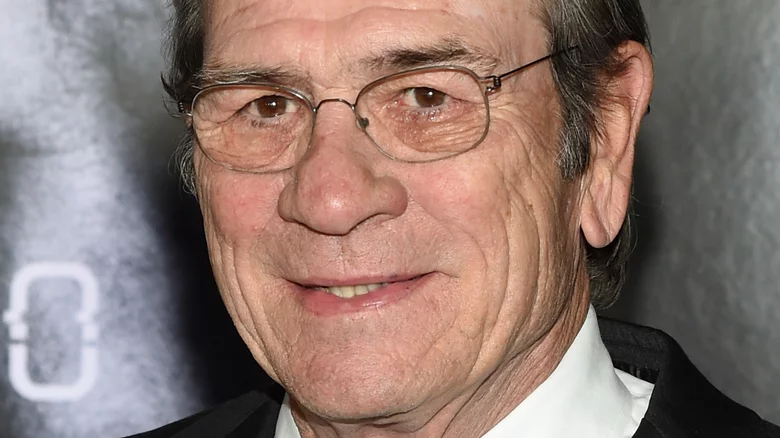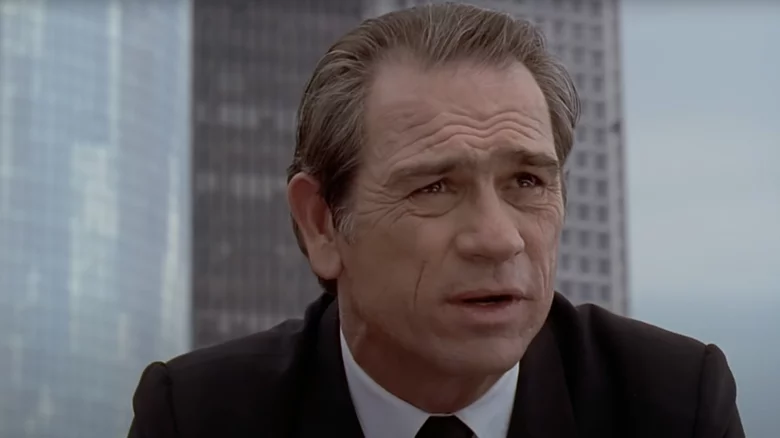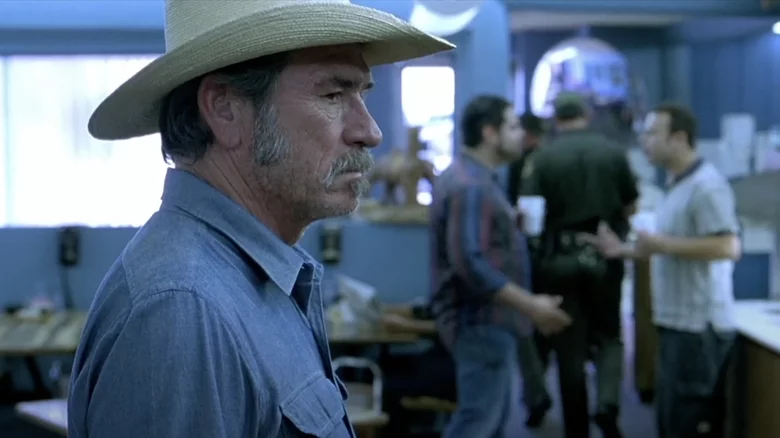Tommy Lee Jones has one of cinema’s most distinctive faces. With his deep-set eyes and craggy features, Jones has rightfully achieved his place in film history as the legendary star of such films as “No Country for Old Men,” “Men in Black,” and “The Fugitive.” In fact, Andrew Davis, director of “The Fugitive,” once called Jones “the Southwestern Bogart” (via Texas Monthly).
The Oscar-winning actor has also earned a reputation for his frankness and steely demeanor. “But isn’t that precisely why he’s so appealing?” asked filmmaker Bill Witliff. He continued, telling Texas Monthly that Jones “has an intensity that’s all his own … You watch other actors on-screen, and you know they are having to invent their intensity. Tommy Lee does not.” Steven Spielberg has also noted Jones’ singular onscreen presence, telling the Los Angeles Times that “Tommy is not just a subtle solo instrument. There is an entire symphony orchestra inside that man.” From his comedic turn in the “Men in Black” franchise to his somber Texas-based directorial efforts, here are a few truths you may not know about Tommy Lee Jones.
He wasn’t comfortable in his Men in Black role

While Tommy Lee Jones’ role as “Agent K” in the “Men in Black” franchise is arguably his best known, it wasn’t an intuitive fit for the generally more serious actor. However, director Barry Sonnenfeld wanted Jones from the start, recalling that, as soon as he finished the script, he turned to his wife and said, “Tommy Lee Jones” (via Inverse). But playing the straight man didn’t come naturally to Jones. “It took a long time for him to feel comfortable with it,” Sonnenfeld told Insider. “I don’t think he understood that comedy.”
According to the production staff of “Men in Black,” it was clear that Jones wasn’t sure that the film was going in the right direction, and wanted to be more overtly comedic. “It was my experience that if he knew it was a comedy he certainly didn’t think it was funny — and he let me know on quite a few occasions,” screenwriter Ed Solomon told Insider, though he also acknowledged that Jones’ performance “upgraded the script in a pretty significant way.”
In the end, Tommy Lee Jones’ acting abilities won out, helping to make the film a success. Sonnenfeld told Insider that, in the end, Jones loved his performance, and would say in interviews, “The secret to being funny is to stand next to Will Smith and to do whatever Barry Sonnenfeld tells you to do.”
He did not get along with Jim Carrey in Batman Forever

While Tommy Lee Jones is known for having a gruff, blunt manner, he was apparently much more combative while making “Batman Forever.” Late director Joel Schumacher told Express that he called Jones a less than complimentary epithet in the pages of People magazine, adding, “He was not kind to Jim Carrey when we were making ‘Batman Forever.'”
In 2017, Jim Carrey expounded on his experience when he was a guest on “Norm Macdonald Life.” Carrey recalled that, during the shoot, he approached Jones in a restaurant. “He went to hug me and he said, ‘I hate you. I really don’t like you,'” said Carrey (via The Hollywood Reporter). “And I said ‘What’s the problem?’ and pulled up a chair, which probably wasn’t smart. And he said, ‘I cannot sanction your buffoonery.'” Carrey guessed that Jones was uncomfortable with the genre, or that perhaps he didn’t like that Carrey, as the hot new star, drew so much attention.
Schumacher was less understanding than Carrey, telling Express, “He did not act towards Jim the way an Oscar winner with a star on Hollywood Boulevard — being the oldest member of the cast, and having such a distinguished career and the accolades to go with it — should have acted towards Jim.”
He’s an award-winning director

Tommy Lee Jones is best known for his work as an actor, but he has also worked on-and-off as a director since 1995, when he directed “The Good Old Boys” for TNT. He also starred in the film, along with Matt Damon, Sissy Spacek, and Frances McDormand. Jones knew he was an unproven director, so he saw his opportunity when producer Edgar Scherick approached him about acting in the project. “I said, ‘Look, Edgar, you really can’t afford me,'” Jones told The New York Times. “‘But if you will go with me to the marketplace in my pursuit of a directing job, I will deliver an expensive actor cheap.'”
Jones felt prepared to take on the role of director after observing a number of the filmmakers he’s worked with on the set. “Over the years, I’ve made a very careful study of lenses and film stocks and lighting and rehearsal techniques,” he told The Telegraph. Jones went on to direct the 2005 film “The Three Burials of Melquiades Estrada,” which premiered at the Cannes Film Festival, as well as “The Sunset Limited” for HBO and “The Homesman.”
“There are directors with so little self-confidence that they’ll do 20 takes,” Jones told The New Yorker in 2008. “Some directors are scared to death of actors — they wouldn’t be directors in the first place if they weren’t control freaks. I am my favorite director.”
